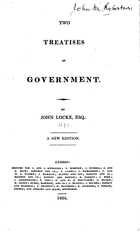
“Freedom of Nature is, to be under no other restraint but the Law of Nature.”
Second Treatise of Civil Government, Ch. IV, sec. 21
Two Treatises of Government (1689)
Context: Freedom of Men under Government is, to have a standing Rule to live by, common to every one of that Society, and made by the Legislative Power erected in it; a Liberty to follow my own Will in all things, where the Rule prescribes not; and not to be subject to the inconstant, uncertain, unknown, Arbitrary Will of another Man: as Freedom of Nature is, to be under no other restraint but the Law of Nature.
